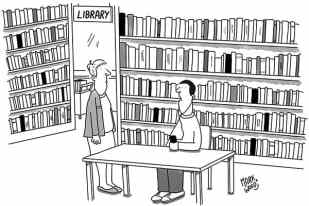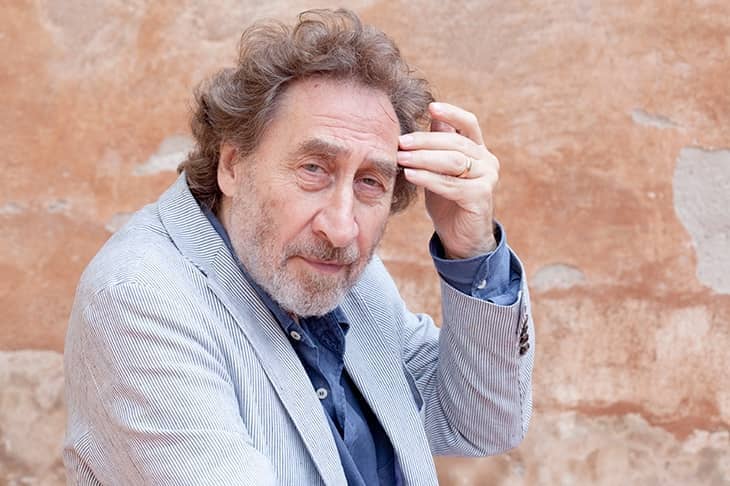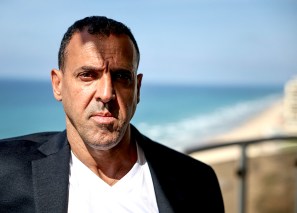Howard Jacobson, who turns 80 this year, published his first novel aged 40. Since then he has produced roughly a book every two years, including The Finkler Question, which won the Man Booker in 2010. Given that he was put on Earth to write, why the wait? This is the subject of Mother’s Boy, a tale of self-persecution in the form of a monologue which includes interjections from the ghosts of his parents and one chapter, recording a period in his twenties that he drifted through in a dream state, printed in a font resembling handwriting.
‘How’s the novel coming along?’ his father would routinely ask after Jacobson graduated from Cambridge with a ‘poor degree’ in English. He was taught by F.R. Leavis, whose claim in the opening line of The Great Tradition that ‘The great English novelists are Jane Austen, George Eliot, Henry James and Joseph Conrad’ would impress Jacobson enough for him to call his son Conrad. Perhaps his own name was the problem? How could you write a novel as great as Pride and Prejudice or Middlemarch or The Golden Bowl ‘when you don’t have a novelist’s name? Howard Jacobson? I didn’t think so.’
Leavis trained his disciples to preach his doctrine rather than add to the English canon, but Jacobson rejects the suggestion that his tutor might have stemmed the flow of his students’ creative genius:
What he did was make us see what a rare thing creative genius was, and how it needed to be distinguished from creative mediocrity. He was not to be blamed if many of us came also to see, under his tuition, wherein we were deficient.

So the years ticked by and Jacobson’s manuscript remained blank. ‘Can you die of not writing a novel?’ he wondered. Dickens and Tolstoy were 24 when they published their first books, and Jacobson, married by this age to his first wife, Barbara, and returned from two wasted years teaching at Sydney University, already considered himself a failure. Until he had written a book he would be, by his own reckoning, only a half a man. But he couldn’t write a book because he had nothing to say.
Before he became a failed novelist, Jacobson was a failed son, a failed undergraduate, a failed husband, a failed father, a failed university lecturer (his students ‘were owed better than me’) and, most importantly, a failed Jew. And before these cumulative failures he had been ‘a failed baby’. He recalls his nappied self as ‘metaphysically at sea, but above all miserable in my body, demeaned by all the appurtenances of baby-being’. He wanted to be neither picked up, put down, pushed in a pram, rocked in a cradle or dressed in a romper suit. ‘A romper suit is not any baby’s outfit of choice. But because I wore a serious expression I looked over and above incongruous in mine.’ Added to which ‘the metal crotch studs made lying on my front an agony’. One benefit of becoming a novelist, Jacobson realised, is that by mocking himself he would prevent others from getting there first.
His mother, a fiercer critic even than Leavis, was 18 when Howard was born in Cheshire in 1942. His father, whose people were Ukrainian Jews and who danced at weddings like a Cossack, once punched Oswald Mosley’s horse on the nose (he was aiming for Mosley himself). A macho man who could tear telephone directories in half, Max Jacobson worked variously as a tailor, an upholsterer, a market stall vendor and a party magician. In his final job as a cab driver he was known as ‘the Godfather’. Max, who never read a novel, ‘made me a novelist because he was himself a novel’, his son writes. Jacobson’s mother, who rocked with laughter at James Thurber and read Tennyson to him, resembled Mr Micawber — ‘one minute sunk in the deepest gloom… the next sitting up on the back of a coach, cheerfully eating chestnuts out of a paper bag’. Worshipped by his mum and derided by his dad, Jacobson was, like his hero D.H. Lawrence, his ‘parents’ battleground’, until he internalised their conflict and went to war with himself.
He apologises to his father for not being the son he’d have chosen ‘had you been offered an assortment’. He also apologises to Barbara for having not been the husband she deserved:
Beware the unfulfilled writer who is discontented every day he doesn’t write a sentence and finds substitutes for writing in aggression, alcohol, cigarettes, late nights, infidelity and, with a terrible inevitability, falling in love with a student. Yes, that tedious old tale.
The cause of his writer’s block, Jacobson grew to realise, was his block about being Jewish
He apologises to his second wife, Ros, for giving her ‘the worst honeymoon had by anyone anywhere’, and possibly the worst marriage too. It was Ros who pulled his first novel out of him, but they now no longer speak. The only memoirist who has said sorry more times than Jacobson is Max Hastings, who apologises in Did You Really Shoot the Television? to anyone who had to suffer his ‘charmlessly assertive’ company as a young man or, worst of all, sleep with him.
The cause of his writer’s block, Jacobson grew to realise, was his block about being Jewish. There were no Jews in Leavis’s Great Tradition, and a ‘deadly mix of snobbery and shame’ prevented Jacobson from writing in his own tradition. In order to become a novelist he needed to become a Jew, and when he wrote about ‘being Jewish’ he found he had something to say. He also broke new ground: America had Roth and Bellow, but Britain had no Jewish novelists. Jacobson’s first novel, Coming from Behind, in which he cast himself as the university lecturer Sefton Goldberg and satirised his time at Wolverhampton polytechnic, punched a hole through a wall. ‘If the words “being Jewish” got me writing, writing them got me being Jewish.’ Jacobson describes himself now as a liberal Zionist, and Rabbi Lionel Sacks officiated at his third and final marriage.
Mining down to the roots of his creativity, Mother’s Boy is very funny, profoundly serious and demonically fluent. If there is a better contemporary account of the cost of becoming a writer I’ve yet to read it.






Comments